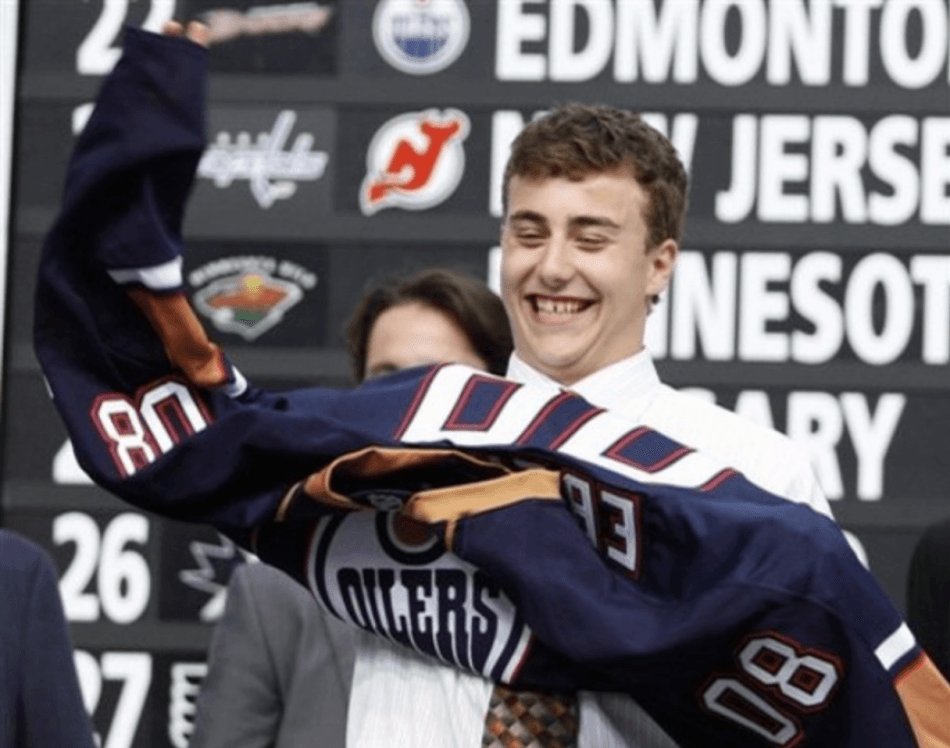Nation Sites
The Nation Network
OilersNation has no direct affiliation to the Edmonton Oilers, Oilers Entertainment Group, NHL, or NHLPA
Throwback Thursday: Jordan Eberle at the World Juniors

Dec 26, 2024, 18:00 ESTUpdated: Dec 27, 2024, 16:01 EST
This year, the World Juniors Championship will be held in Ottawa.
It’s the first time the tournament has been held in the nation’s capital since 2009, and it is one of the best World Juniors in recent memories. A big reason for that is because of a former Edmonton Oiler, Jordan Eberle.
There have been countless players who have worn the Canada jersey that are better than Eberle; however, has there been a player with the impact of Eberle? I don’t think so. Until recently, Eberle’s 14 goals in the two tournaments he played were the most for Team Canada, only surpassed by Connor Bedard, who scored 17 goals in 16 games.
Of course, Bedard was 16 and 17 in his respective tournaments, winning the Gold Medal in 2022 and 2023. This was the first time Canada had won back-to-back Gold Medals since 2009, but let’s look at what made the 2009 tournament so good, as well as Eberle’s career at the WJC.
Setting up the 2009 WJC
When the World Juniors became an official tournament in 1977, the Soviet Union dominated, winning the first four tournaments to set the record. Canada won their first Gold Medal in the 1982 WJC before they dominated the 1990s. In 1993, they won their sixth Gold Medal, starting the first of five straight Gold Medals.
That streak was ended in 1998, as they failed to even play in one of the two medal games. This was the first year of a seven tournament Gold-less drought. However, Canada won their 11th Gold Medal in the 2005 tournament, as Sidney Crosby, Corey Perry, Ryan Getzlaf, and Shea Weber dominated Alex Ovechkin and Evgeni Malkin in the Gold Medal game, with Team Canada defeating Team Russia 6-1 in the Gold Medal game.
In the rematch of the 2005 Gold Medal game, Canada once again defeated Russia by five goals for their second Gold Medal in as many years. Team Canada had a third consecutive undefeated tournament, beating – you guessed it – Team Russia for the Gold Medal. The 2007 WJC famously saw Jonathan Toews and Carry Price push Team Canada over Team USA in the shootout.
Canada lost to Sweden in the group stage, the first time Canada had lost in the group stage since 2001. Sweden dominated the group stage, winning 56 consecutive games from the 2006 tournament until they were beaten in 2021. In the Gold Medal game against Sweden, Canada blew a 2-0 lead against Sweden, including a late goal from Thomas Larsson. However, Matt Halischuk scored the Gold Goal in overtime, giving Canada their fourth consecutive Gold Medal.
The 2009 WJC
Jordan Eberle was selected 22nd overall by the Oilers in the 2008 draft, making his World Junior debut later in the year. Canada thumped Czechia in their opener, winning 8-1 with Eberle picking up two assists. Their second game was against Kazakhstan, as Canada put up an incredible 15 goals, with Eberle picking up a goal and two assists. Eberle had an additional assist in Canada’s 5-1 win, setting up the game to win the group against Team USA on New Year’s Eve.
This is the first World Junior game I remember watching because it was so memorable. Team USA jumped out to an early 3-0 lead thanks to goals from Kevin Shattenkirk, Jimmy Hayes, and Jim O’Brien. On the power play, John Tavares scored the opening goal for Canada, banging in the loose rebound. Less than a minute later, he scored a highlight reel goal to drag Canada back into the game.
The momentum was all in Canada’s hands, and that was only helped by Team USA, as in the ensuing celebration, a player on the American bench high-sticked a Canadian player. Before the end of the first period, Eberle scored his second goal of the tournament on the power play to tie the game.
Canada carried that momentum into the second period, as Zach Boychuk scored an early power play goal, before Cody Hodgson scored the game-winning goal, also on the power play, just over three minutes after the Americans tied the game. John Tavares scored his hat trick goal into the empty net, before former Oiler Tyler Ennis also put one into the empty net.
With the win, Canada got a bye into the semifinals, setting up the best game in World Junior history.
The semifinal game
Due to geopolitics, Team Russia hasn’t played in the last few World Juniors, and it really feels like the tournament is lacking. However, they had been declining in recent years leading up to their expulsion before the 2022 tournament. They hadn’t won a Gold Medal since 2011, often finishing with the Silver Medal or Bronze Medal.
However, in the late noughties/early 10s, Team Russia was one of the most formidable teams in the tournament. The 2009 tournament was no different, as they played Team Canada in the semifinal.
Canada took the early lead, as Brett Sonne scored just over two minutes into the game. Maxim Goncharov tied three minutes later before Canada and Russia traded goals 16 seconds a part. Eberle scored his third goal of the tournament in the second period, giving Canada a 3-2 lead heading into the third period.
It took Russia 51 seconds into the final frame to tie the game. However, Canada once again took the lead thanks to an Angelo Esposito shorthanded goal. On the same power play, Russia tied it thanks to Sergei Andronov’s goal, before Dmitri Klopov scored with just over two minutes remaining in the game, giving Russia a 5-4 lead.
The slogan throughout the tournament was “Drive for Five”, as Canada was looking to match the tournament record of five consecutive Gold Medals. But it looked as if that drive was going to fall short as Canada barely had any time left in the game.
Canada spent the rest of the game in Russia’s end and a late icing left a tired Russian group on the ice. Russia had another chance to clear it, but Ryan Ellis jumped up against the boards to keep the puck in. After a lengthy puck battle, tournament MVP John Tavares backhanded it toward the goal, with Eberle picking it up and using his backhand to slot it past Russia’s netminder.
I was nine years old when the tournament was hosted in the city I grew up in. This was the first World Juniors I followed in full, and man what an introduction. I didn’t watch this goal live, as my bedtime was earlier in the night. I was listening to the radio when this goal was scored with 5.4 seconds left and I immediately ran downstairs as I was allowed to watch overtime. This goal, alongside José Bautista’s home run in 2015, still evokes strong emotions in me that no other sporting moment can. Eberle’s goal is an annual watch for me.
Overtime solved nothing, giving us a shootout. Eberle was the first shooter, beating the Russian netminder with a nasty backhand. Russia failed to counter before Tavares put Canada up by two. Another save by Dustin Tokarski sent Canada to the Gold Medal game.
It happened again
Canada went on to win its fifth straight Gold Medal, as they defeated Team Sweden 5-1. Eberle scored an empty net goal to seal the game. For the second time, Canada won five consecutive Gold Medals. Eberle and Canada had a chance to break the record the following season in Saskatchewan. The Oiler prospect was born in Saskatchewan and played for the Regina Pats of the Western Hockey League.
Canada opened their tournament with a 16-0 win over Latvia, with Eberle scoring twice. They followed it up with a 6-0 win over Switzerland, with Eberle picking up a goal and four assists. Eberle had another assist in Canada’s 8-2 win over Slovakia, before another date with Team USA on New Year’s Eve.
The game was tied at four after regulation, with Eberle scoring two of those goals, leading to this game heading into the shootout. Once again, Eberle scored the opening goal. After Canada scored three times, Jake Allen shut the door giving Canada the group.
Team Switzerland upset Team Russia in the quarterfinals, setting up an easy matchup for Canada in the semifinals, as they defeated the famously neutral country 6-1. America defeated two Nordic teams, setting up a New Year’s Eve rematch.
The Gold Medal game was tied at three heading into the third period. Jerry D’Amigo and Derek Stepan combined for two goals in just over two minutes early in the third period, but Eberle was up to the task. He scored with just under three minutes left to bring Canada to within one.
Just over a minute later with a minute and 35 seconds left, Eberle scored his second of the game as Canada overcame a late 5-3 deficit.
These two goals are far less memorable than his goal in Ottawa for a few reasons. For starters, Canada still had time. But the bigger reason was because unfortunately, they were unable to win their sixth consecutive, record-setting, Gold Medal. In the overtime period, John Carlson scored, giving America their second Gold Medal in the history of the tournament.
Eberle has gone on to have a great career. Another memorable Eberle moment was his first goal of his career against Calgary, as he toe-dragged around the defender and beat the Flames netminder. In his Oiler career, he scored 165 goals and 382 points in 507 games, leading the team with 34 goals and 76 points in his sophomore year. Both totals remain a career-best.
He was traded to the New York Islanders after the 2017 postseason, the first time in 11 seasons the Oilers made the postseason. Eberle only picked up two assists but proved to be a vital playoff performer for the Islanders, scoring 13 goals and 34 points in 49 postseason games.
Eberle was selected by the Seattle Kraken in the expansion draft, where he serves as the team’s captain. In the Kraken’s only postseason run, they made it to Game 7 of the second round, with Eberle scoring six goals and 11 points.
He should have retired an Oiler, but he’s given us countless moments, with his World Junior success being the most memorable.
If you enjoy my content, you can follow me on Bluesky @ryleydelaney.bsky.social.
This article is presented by Deloitte Canada
Being competitive today means working differently. Deloitte’s managed services offer a new way to embed continuous advantage by energizing and driving your critical business functions. Unlock talent on demand, advance innovation, and gain insight to maintain a competitive advantage. Build stronger, transform faster, and turn your cost centres into value generators. Operate with Deloitte.
Recent articles from Ryley Delaney
- Another hat trick from a defenceman as Ekholm’s trio of tallies lift Oilers over Ducks: Recap, Reaction and Highlights
- Evan Bouchard’s three-goal, six-point night lifts Oilers over Capitals 6-5 in overtime win: Recap, Reaction and Highlights
- NHL trade rumours: Five top-nine forwards the Oilers could target
Breaking News
- Another hat trick from a defenceman as Ekholm’s trio of tallies lift Oilers over Ducks: Recap, Reaction and Highlights
- 20 years ago today, the Oilers acquire Jaroslav Spacek and Dick Tarnstrom
- GDB 54.0: Oilers need wins against Pacific foes to secure home ice advantage (6:30 PM, Prime)
- Scenes From Morning Skate: Samanski’s big debut and Kapanen’s return
- A look at the impact Oilers’ Zach Hyman and Evan Bouchard have had since Team Canada released its Olympic roster

